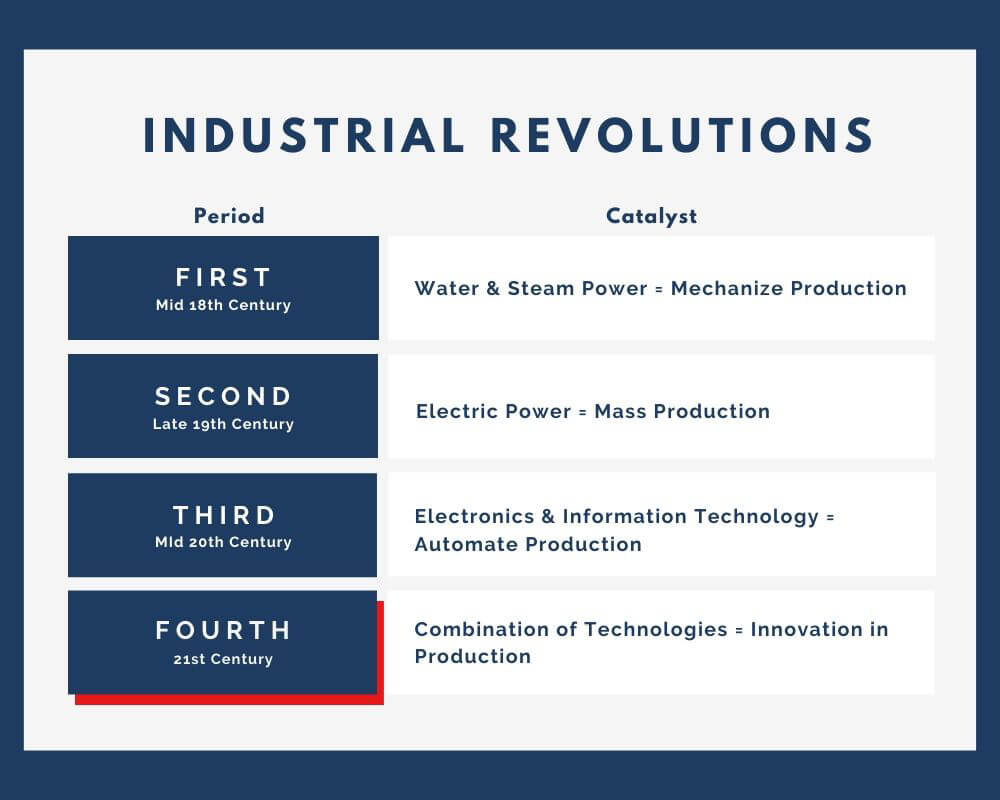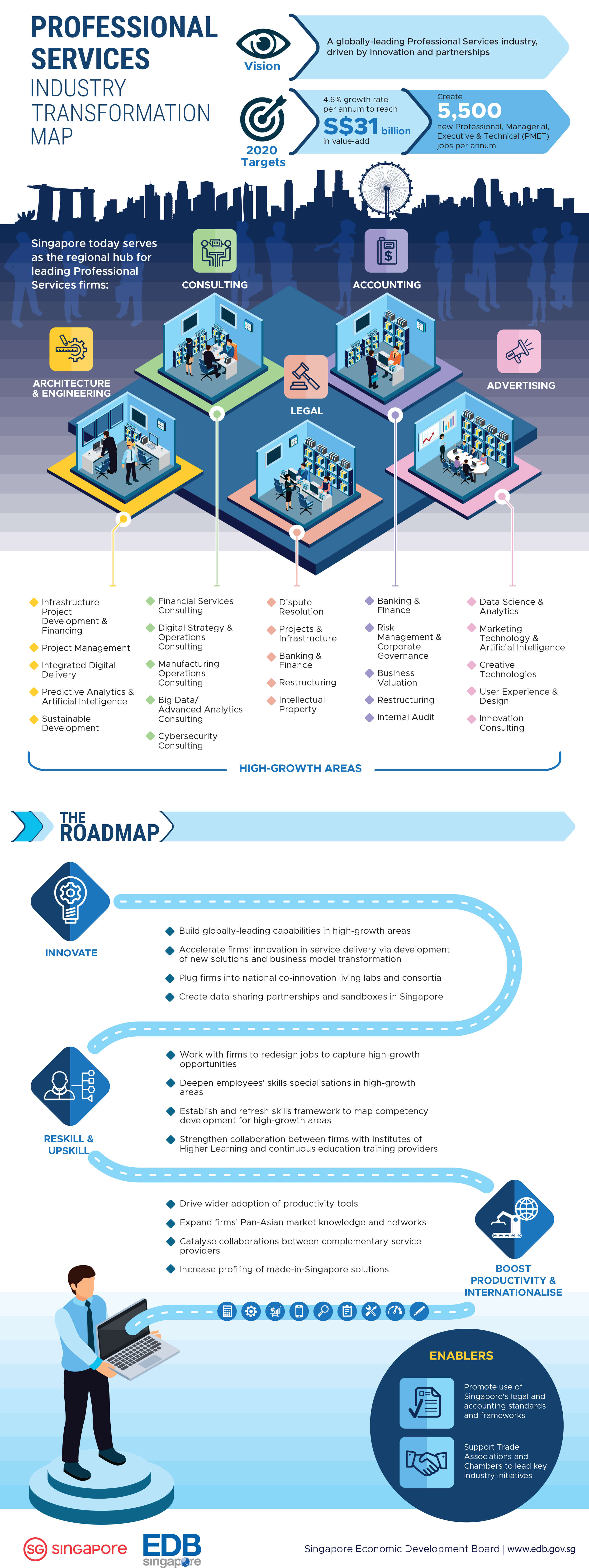Industry 4.0 and preparing for the future of work in Singapore
As the world shifts to a reluctant slumber amidst the current health crisis, the virulent effects of the pandemic is greatly felt in all aspect our lives. Understandably, we try to serve our social...

As the world shifts to a reluctant slumber amidst the current health crisis, the virulent effects of the pandemic is greatly felt in all aspect our lives. Understandably, we try to serve our social needs with our nimble fingers scrolling through the news, job listings, messages from loved ones, and the occasional workout regime that we always promised to do but somehow never got around to doing. Perhaps through this daily routine, some may have come across the term Industry 4.0.
Table Of Content
What is it exactly?
Are we moving towards a world parallel to the likes of Blade Runner and I,Robot?
Despite the sci-fi feel of the term, Industry 4.0 – also known as the Fourth Industrial Revolution – is not likely to bring about the digital superlatives depicted in Hollywood movies. Yet. On that note, however, these films do capture the essence of its definition which amalgamates technological and human capacities.
The phrase “Fourth Industrial Revolution” was ideated by Professor Klaus Schwab, Founder and Executive Chairman of the World Economic Forum.
“It (The Fourth Industrial Revolution) is characterised by a fusion of technologies that is blurring the lines between the physical, digital, and biological spheres.”
As depicted in the succinct infographics below, the world has seen three preceding industrial revolutions, each having its own catalyst.

Industry 4.0 is commonly misunderstood as an extended version of the third industrial revolution – also known as the Digital Revolution. Despite having similar drivers, Professor Schwab explains that Industry 4.0 is distinct in three ways – velocity, scope, and systems impact.
Unlike its predecessors, the Fourth Industrial Revolution is characterised by its non-linear and increasingly rapid growth, expansive penetration across various industries, as well as its extensive effects on how these industries operate. These transformations are and will be stimulated by emerging technologies like (but not limited to) artificial intelligence, robotics, Internet of Things (IoT) and biotechnology.
Back in 2016 where Professor Schwab’s article debuted the term, he advised that the response to harness the benefits of the revolution and also curb its potential negative impacts has to be unified and inclusive, “involving all stakeholders of the global polity, from the public and private sectors to academia and civil society.”
In Singapore, the response has been swift, with various governmental bodies acting in unison to prepare the country to embrace Industry 4.0. With the nation’s manufacturing industry accounting for slightly more than a fifth of the nominal GDP in 2019, one of the main approaches is to ensure that the manufacturing sector remains globally competitive. The Singapore Economic Development Board seeks to reinvent the manufacturing industry via digitalisation, process-automation, and enhancing efficiency. The end-goal would be a technologically advanced industry that has “high-level integration of information, communication and systems by connecting multiple devices and machines at every step of the manufacturing process.”
The transformation journey would require the industry to be agile, and reflecting expertise in as well as the adoption of new technologies such as 3D printing and augmented reality (AR). The former would allow products to be manufactured in a fraction of what it would normally take to produce via traditional manufacturing methods and without risking the interruption of the production line. This would allow the industry to respond swiftly to critical demands – most salient of which would be the production of personal protective equipment. AR, on the other hand, would enable flexibility as tools and processes can be recalibrated based on the specifics of the end product. This is done by way of virtually matching the existing tool and/or process to a digital twin.
With an increasingly consumer-driven economy, the ability to meet the fast-changing demands of the consumers would be pivotal for countries and their industries to stay ahead of the global competition. Some of the themes that were central to the 2018 Industrial Transformation Asia-Pacific (ITAP) was how technologies like big data, artificial intelligence (AI), and robotics would also lead the change in the manufacturing industry.
Although consumer needs are fluid and ever-changing, harnessing technologies like big data and AI would help find the key commonalities and subtleties that would create opportunities for the industry to accurately meet the demands of consumers, not only quicker but in a more individualized manner. With the availability of autonomous manufacturing solutions such as robotics entering the manufacturing industry, this would allow businesses to scale-up easily while diversifying its human capital to more critical functions.
Reflecting Schwab’s counsel, these technologically driven transformations are being addressed at a national level. Recognising the inevitably of Industry 4.0, the Ministry of Trade and Information has identified four pillars of approach in preparing the country for Industry 4.0 – productivity, jobs and skills, innovation, as well as trade and internationalisation.
An Industry Transformation Programme was initiated, with fiscal support of US$3.2 billion (S$4.5 billion) spanning across 23 industries under six identified clusters that make up 80% of Singapore’s GDP. Collaboration between stakeholders within each industry is expected, with roadmaps (Industry Transformation Maps) that are co-created to guide/inform the industry’s growth.

On the education and skills-upgrading front, the Industry Transformation Maps (ITMs) was used as an impetus to develop the SkillsFuture Framework. The framework supports the ITMs by providing important information on sector, career options, occupations/job roles and current as well as emerging skills necessary for these roles. In addition, it also offers training programmes aimed at skills upgrading and mastery. At a macro perspective, the framework provides individuals, employers, and training providers a common understanding of the skills repertoire that the country needs. This would help facilitate the recognition, design, and assessment of programmes targeted for skills and career development.
Led by Skillsfuture Singapore, the country’s national life-long learning movement, the SkillsFuture Framework is one of many programmes that aim to provide Singaporeans with the opportunity to achieve their fullest potential.
SkillsFuture Credit
Individuals looking at micro-skilling for learning that is either outside of their job scope (ie as a hobby), or as a supplement to their current role can consider the SkillsFuture Credit. The flexible nature of this initiative enables individuals to choose from a variety of courses/professional certifications offered by employer-recognized training providers, as well as Massive Open Online Courses (MOOCs) that are mostly self-paced.
SkillsFuture Work-Study Programme
The SkillsFuture Work-Study Programme, as the name suggests, is suitable for individuals looking to secure academic qualifications ranging from Diploma to Postgraduate via a work-study pathway. For example, individuals looking to obtain a degree while still being able to work and gain relevant industry knowledge can do so if they are keen to work in key Industry 4.0 sectors. With the initiative being done in partnership with the local universities in Singapore, those who are keen would have to note the specific course requirements of the particular institution on top of the eligibility laid out by SkillsFuture.
Similar to SkillsFuture, which is a statutory board overseen by the Ministry of Education to drive the nation’s skills learning and upgrade, the Ministry of Manpower also has the Workforce Singapore (WSG) which is geared towards jobs and enterprises. One of the key initiatives by WSG is the Professional Conversion Programme.
Professional Conversion Programme (PCP)
In its initial stages, the PCP had a focus on filling in the labour shortage in critical industries like healthcare (ie nursing, and allied health). However, as the job market diversified, the PCP included more industries and aims to help mid-career PMETs looking to transition to other roles. The programme has three approaches – Place and Train, Attach and Train, and Re-deployment. Successful individuals will not only be provided training, but they will also be provided with a training stipend that is tiered but commensurate to their working experience.
It is without a doubt that many are struggling with the challenges brought about by the COVID19 health situation. However, with Singapore’s government commitment to aid businesses and Singaporeans via a variety of fiscal stimulus package – the Fortitude Budget being the fourth announced in May 2020 – there are opportunities that can be seized. Perhaps the outcomes of these initiatives are not as immediate as we would hope to be, but an idle mind festers negativity that is counterproductive to our legacy of resilience and excellence. As the famous saying goes, “A year from now you may wish you had started today.”, and today is what you make of it. Carpe diem!
















